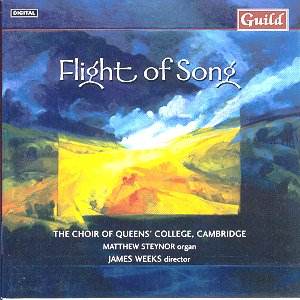Flight of
Song
Howard
SKEMPTON (b. 1947) We who with songs
(1995) Opportunity (2000) Rose-Berries (1990) Song at the
Year's Turning (1980) The Flight of Song (1996) To Bethlem
did they go (1995) He Wishes for the Cloths of Heaven
(1999)
Judith
WEIR (b. 1954) Ascending into Heaven
(1983) Two Human Hymns
(1995)
Jonathan
HARVEY (b. 1939) Thou mastering me
God (1989) God is our Refuge (1986) The Tree
Sir Michael
TIPPETT (1905-1998) Magnificat and
Nunc Dimittis
(1963)
 The Choir of Queen's College,
Cambridge directed by James Weeks
The Choir of Queen's College,
Cambridge directed by James Weeks
Matthew Steynor, organ
 Guild GMCD 7213 [DDD
64:25]
Guild GMCD 7213 [DDD
64:25]
Amazon
UK £11.99 Amazon US

Guild is proving to be an increasingly enterprising and valuable label and
we are here presented with an interesting collection of English choral music,
recorded (with the exception of two short works by Skempton), in the beautiful
acoustic of Queen's College Chapel itself, whose resonances are ideally suited
to this repertoire.
The composer best represented is Leamington Spa-based Howard Skempton. Skempton's
roots are in experimental music, being one of the founder members, along
with the late Cornelius Cardew, of the Scratch Orchestra in the 1960's. At
the time he worked regularly with other composers such as John Tilbury, Hugh
Shrapnel and John White although it is Skempton whose reputation has been
the most lasting. His music is tonal and has a sincerity which goes far deeper
than the apparent surface simplicity of the music itself. Anyone who is familiar
with his haunting orchestral work Lento, which became something of
a cult piece following its release on the NMC Label a few years ago, will
recognise the language of these short choral works which span a period of
around twenty years. The earliest piece, Song at the Year's Turning,
a setting of RS Thomas, is one of his most austere settings, impressive in
its painting of the equally austere and wintry verse. What it shares with
later settings (apart from Skempton's characteristic abrupt endings, the
music just seeming to stop mid sentence) is a great sensitivity to the verse,
which is never allowed to become subservient to the music. There is contrast
in abundance also. Compare the abstract use of spoken word, graphically notated
and perhaps reminiscent of Berio, at the beginning of The Flight of
Song, with the third movement of the same work, Chimes, which
for me recalls the magical underwater tolling of bells in the first of Vaughan
Williams' Three Shakespeare Songs, against the almost naïve simplicity
of Rose-Berries, a1990 setting of Mary Webb. Judging by these works alone,
it would be good to hear more of Skempton's prolific output committed to
disc.
Judith Weir has enjoyed considerable critical acclaim in recent years and
justifiably so. Her music, often economic in means but always with something
significant and original to say, has been only reasonably represented on
disc but particularly well represented in the concert hall. I first heard
Ascending into Heaven some years ago in a BBC broadcast and recall
being struck at the time by its ethereal beauty. Weir's carol Illuminare,
Jerusalem has become something of a contemporary classic and Ascending
into Heaven, dating from two years earlier, inhabits a similarly haunting
sound world. The prominent part for organ is extremely effective and James
Weeks draws sensitive singing from the choir who are clearly very much at
home with this music. The Two Human Hymns, Love bade me welcome and
Like to the falling of a star, of twelve years later, are less ambitious
and demonstrate a softening of Weir's harmonic language. Nonetheless they
are pleasurable settings, once again sung with feeling.
Many may know and consider Jonathan Harvey an avant-gardist, although he
has produced a considerable quantity of choral and church music throughout
his career which shows him in a very different light. The mystical element
of his own faith often surfaces in his music, nowhere more evident than in
his orchestral masterpiece, Madonna of Winter and Spring, recently
released in a magnificent recording on Nimbus by the Netherlands Radio Symphony
Orchestra under Peter Eötvös, essential listening for anyone wishing
to explore his output. The three works featured here appear to date from
the 1980's although we are not given a date for The Tree. Harvey achieves
a richness of sonority from the choir and organ which beautifully enhances
these deeply felt settings, whose mysterious, sometimes melting, sometimes
slightly harder edged harmonies leave a lasting impression. One can sense
that Thou mastering me God and God is our Refuge came
from the very soul of the composer.
The Magnificat and Nunc Dimittis of Sir Michael Tippett, dating to
1963, is by far the best known work on the disc. This is vintage Tippett,
the idiosyncratic melody at once recognisable in the opening organ flourish,
the choir emphasising the often stark harmony particularly well. The moving
Nunc Dimittis which follows is in complete contrast, a sustained choral
background over which floats a solo soprano line sung with poignant tenderness.
This disc offers much to commend in both the choice of programme and sensitive
performances given by the Choir of Queen's College, who receive excellent
support from the organist Matthew Steynor. Most of all it leaves a desire
to further explore the music of the fine composers represented. There are
useful programme notes provided by the choir's director James Weeks, who
at twenty two years of age, is a name I am sure we will hear more of in years
to come.
Christopher Thomas
Performance and sound


